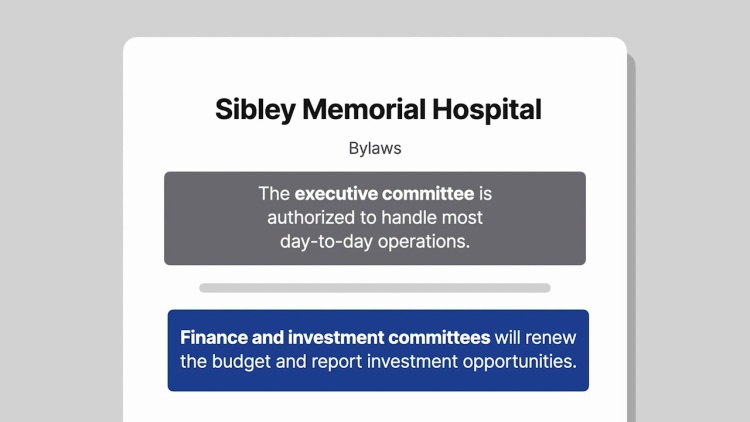Stern v. Lucy Webb Hayes National Training School for Deaconesses and Missionaries
United States District Court for the District of Columbia
381 F.Supp. 1003 (1974)
- Written by Craig Conway, LLM
Facts
The Lucy Webb Hayes National Training School for Deaconesses and Missionaries (the School) (defendant) was founded to provide health care services to the poor in the Washington, D.C. area. The School then built Sibley Memorial Hospital (Sibley) (defendant) to carry out its charitable purpose. Under Sibley’s bylaws, the Board of Trustees (the Board) created an Executive Committee authorized to handle most of Sibley’s day-to-day operations such as opening checking and savings accounts, approving budgets, renewing mortgages, and entering into contracts. A separate Finance Committee was also created to renew the budget and report on possible investment opportunities. However, for nearly 20 years, the Finance Committee and a similar Investment Committee never met and, instead, management of Sibley was handled exclusively by two trustee officers, Dr. Orem, the hospital’s administrator, and Mr. Ernst, the Treasurer. The other trustees played little or no role in Sibley’s daily operations. The Board and the Executive Committee routinely accepted and ratified the actions of Orem and Ernst. After the death of Orem and Ernst, the Finance and Investment Committees became active. Thereafter, several patients of Sibley, including Stern (plaintiff), filed a class action suit against Sibley alleging financial mismanagement, conspiracy, and breach of duty. The amended complaint named 9 Trustees, 6 financial institutions, and Sibley itself as defendants. The suit claimed that the defendants conspired to unjustly enrich themselves by selecting only the financial institutions they were affiliated with as depositories for the Sibley’s money. These financial institutions offered Sibley little or no interest on the deposited money. At the close of Stern’s case, the trial court dismissed the complaint as to the financial institutions and Stern appealed.
Rule of Law
Issue
Holding and Reasoning (Gesell, J.)
What to do next…
Here's why 907,000 law students have relied on our case briefs:
- Written by law professors and practitioners, not other law students. 47,100 briefs, keyed to 996 casebooks. Top-notch customer support.
- The right amount of information, includes the facts, issues, rule of law, holding and reasoning, and any concurrences and dissents.
- Access in your classes, works on your mobile and tablet. Massive library of related video lessons and high quality multiple-choice questions.
- Easy to use, uniform format for every case brief. Written in plain English, not in legalese. Our briefs summarize and simplify; they don’t just repeat the court’s language.





